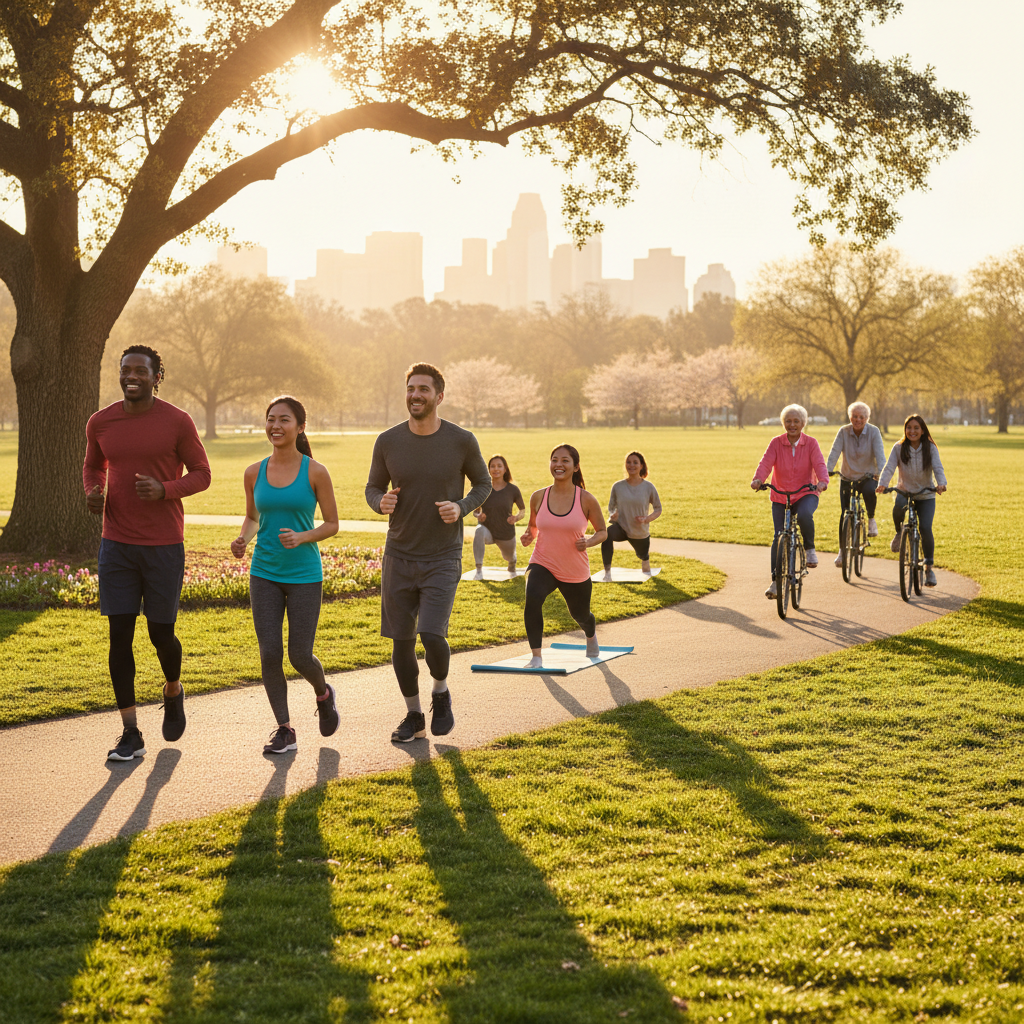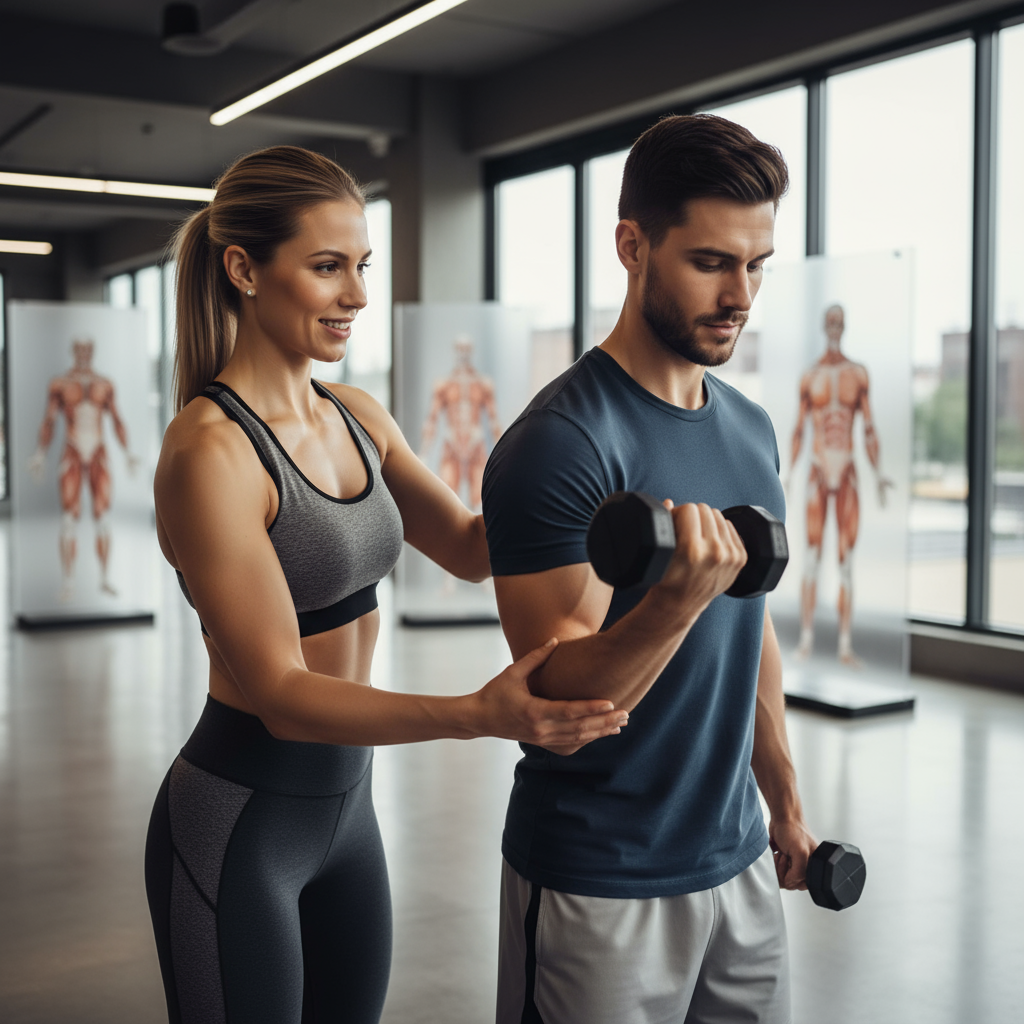
Table of Contents
Introduction
Picture this: you wake up feeling genuinely energized. Your mind is sharp, your body feels strong, and you’re ready to tackle whatever the day throws at you. Sounds too good to be true? It’s not. Regular physical activity is your ticket to this kind of everyday vitality—and honestly, it’s one of the best investments you’ll ever make in yourself.
Here’s what most people don’t realize about exercise: it’s not just about looking good in your jeans or hitting some arbitrary fitness goal. Sure, those things are nice. But exercise is doing incredible things behind the scenes—strengthening your heart, building up your bones, keeping your lungs healthy. Health researchers have been studying this for decades, and the results are pretty amazing: regular exercise slashes your risk of heart disease, diabetes, and osteoporosis. It’s like having a superpower that fights off chronic illness. And if you’re dealing with daily stress (who isn’t these days?), understanding how stress impacts the body shows just how crucial movement becomes for keeping your sanity intact.
But wait—there’s more to this story. Exercise does something almost magical for your brain. Those endorphins everyone talks about? They’re real, and they’re spectacular. We’re talking about a natural mood booster that can calm anxiety and sharpen your thinking. The research on mental health and exercise benefits reveals how physical activity literally rewires your brain for better memory, learning, and emotional resilience. And here’s something you might not have considered: exercise transforms your breathing. Better lung capacity means more energy for everything you do, which is why learning how to improve lung capacity through movement is such a game-changer.
Now, let’s talk about the perfect partnership: exercise and nutrition. Think of them as best friends who make each other better. When you combine smart eating (like the strategies in how to maintain a balanced diet) with regular movement, something amazing happens. Your metabolism kicks into higher gear. Your immune system gets stronger. Your body becomes this efficient, well-oiled machine. Even something as simple as drinking green tea—with all its antioxidant goodness and metabolism benefits —works better when you’re active. It’s like everything clicks into place.
Let me guess: you’re probably thinking, “This all sounds great, but staying motivated is the hard part.” You’re absolutely right. That’s why exploring how to stay motivated to exercise can be a total game-changer. And here’s a pro tip: variety is your friend. Take cycling, for example. It’s not just cardio—it builds strength too, and it’s actually fun. The fitness benefits of cycling show how the right activity can turn exercise from something you dread into something you actually look forward to.
What You’ll Learn in This Guide
This guide is going to walk you through everything you need to know about making physical activity work for you. We’re not just talking theory here—this is practical, actionable stuff that you can start using today.
- Physical Health Benefits: We’ll break down exactly how exercise transforms your cardiovascular system, builds stronger muscles and bones, and helps you maintain a healthy weight without the stress.
- Mental Health and Cognitive Improvements: You’ll discover how movement becomes your secret weapon against stress, anxiety, and depression, while boosting your brainpower and focus in ways that might surprise you.
- Long-Term Disease Prevention: Here’s where it gets really interesting—we’ll show you how consistent exercise acts like a shield against diabetes, certain cancers, and other chronic diseases that you definitely don’t want to deal with.
- Social and Lifestyle Enhancements: This one’s often overlooked, but exercise can revolutionize your social life, help you sleep like a baby, and generally make everything else in life feel easier and more enjoyable.
As we dig deeper, you’ll get step-by-step guidance on starting your exercise journey the right way. No overwhelming workouts or unrealistic expectations—just smart, sustainable approaches that actually stick. Because here’s the thing: this isn’t about becoming a fitness fanatic overnight. It’s about discovering how movement can become a natural, enjoyable part of who you are.
Throughout everything we cover, we’ll point you toward research-backed insights and resources that can deepen your understanding. For instance, really grasping the physiological impact of stress helps you see why exercise isn’t just nice to have—it’s essential for managing modern life. And when you combine that with solid balanced nutrition, you’re not just improving your health—you’re completely upgrading your quality of life.
By the time you finish reading this, you’ll understand something important: regular physical activity isn’t just another item on your to-do list. It’s the foundation that makes everything else in your life work better. Your energy, your mood, your health, your confidence—it all gets an upgrade when you make movement a priority. Ready to see what’s possible when you give your body what it’s designed for? Let’s dive in and discover how simple, consistent activity can open doors to a version of yourself you might not even know is waiting.

You’ve probably heard it a thousand times: exercise is good for you. But here’s what’s really fascinating—regular physical activity doesn’t just change your body. It transforms your mind, your mood, and pretty much everything about how you feel day-to-day. We’ve covered the basics already, so now let’s dig into the really good stuff: how staying active can completely reshape your health (both inside and out) and set you up for a longer, happier life. Think of this as your roadmap to understanding why that workout you keep putting off might be the best thing you do for yourself today.
Physical Health Benefits of Regular Exercise
Here’s the thing about exercise—it’s like a master key that unlocks better health across the board. Your heart gets stronger, your muscles get more defined, your bones become denser, and managing your weight? It actually becomes manageable. These aren’t just nice side effects; they’re your ticket to avoiding chronic diseases and feeling amazing in your own skin. Want to know the secret sauce? Understanding exactly how exercise works its magic will keep you motivated when Netflix is calling your name. And speaking of foundations, pairing your workouts with smart nutrition (like learning how to maintain a balanced diet) is what turns good intentions into real results.
Let’s get specific for a minute. Every time you get your heart pumping—whether it’s a brisk walk or that spin class you love to hate—you’re literally rewiring your cardiovascular system. Your blood pressure drops, circulation improves, and your heart becomes this incredibly efficient machine. Then there’s strength training, which might sound intimidating but is actually your best friend for building muscle and keeping your bones strong as you age. (Trust me, your future self will thank you.) Plus, here’s something cool: regular activity doesn’t just burn calories during your workout. It revs up your metabolism and keeps it humming long after you’re done sweating. For those ready to get serious about combining fitness with weight goals, these fitness tips for weight loss offer practical strategies that actually work in the real world.
Key Aspects of Physical Health Benefits
Breaking down the physical perks helps you see exactly what you’re working toward when you lace up those sneakers:
- Cardiovascular Improvements: Your heart becomes a powerhouse. Lower blood pressure, better circulation, and way less risk of heart disease or stroke. Think of aerobic exercise as training your heart to be more efficient at pumping oxygen-rich blood to every corner of your body.
- Muscle and Bone Strength: This is where resistance training shines. You’re not just building muscle tone (though that’s nice too)—you’re creating a strong foundation that protects you from osteoporosis and keeps your joints happy. Strong muscles are basically your body’s built-in injury prevention system.
- Weight Management: Exercise turns your body into a calorie-burning machine and helps regulate those hunger signals that can drive you crazy. It’s not about punishment; it’s about creating a sustainable balance that makes maintaining a healthy weight feel natural instead of constant work.
- Metabolic Regulation: Here’s where things get really interesting. Exercise actually changes how your body handles insulin and blood sugar, which is huge for preventing type 2 diabetes. Your hormones start working with you instead of against you—something we’ll explore more when we talk about long-term disease prevention.
But wait—there’s more. (And I mean that in the best way possible.) All these physical improvements create this ripple effect that touches your mental health too. Better sleep, more energy, increased confidence—suddenly you’re not just stronger physically, you’re more resilient emotionally. That’s where the real magic happens.
Mental Health and Cognitive Benefits of Physical Activity
Now we’re getting to my favorite part. Exercise isn’t just about looking good in jeans (though that’s a nice bonus). It’s nature’s antidepressant, anxiety reducer, and brain booster all rolled into one. Every time you move your body, you’re triggering this amazing cascade of feel-good chemicals called endorphins. These little mood lifters create what runners call a “high,” but you don’t need to run marathons to feel it. Even a good walk can shift your entire day. Need more convincing? Check out the research on mental health and exercise benefits that backs up what many of us already know from experience.
And here’s something that might surprise you—exercise is basically brain food. While you’re sweating it out, you’re actually growing new brain cells and improving connections between them. Better memory, sharper focus, clearer thinking. It’s like upgrading your mental operating system. The best part? You don’t need to choose between cardio and strength training for brain benefits. Both deliver, so pick what you enjoy and your brain will thank you for decades to come.
Key Aspects of Mental Health and Cognitive Benefits
Understanding how exercise transforms your mental game makes every workout feel like an investment in your happiness:
- Stress Reduction: Those endorphins we talked about? They’re your natural stress busters. Exercise gives you a healthy way to work through tension and worry, literally changing your body’s stress response. It’s like having a reset button you can press whenever life gets overwhelming.
- Anxiety and Depression Relief: Exercise actually changes your brain chemistry in ways that help fight anxiety and depression. It’s not a replacement for professional treatment when you need it, but it’s an incredibly powerful complement that can make a real difference in how you feel day-to-day.
- Cognitive Function Enhancement: Want to be sharper at work or school? Exercise is your secret weapon. It improves memory, helps you concentrate better, and makes learning new things easier. Think of it as cross-training for your brain.
- Long-Term Brain Health: This might be the most important benefit of all. Regular exercise appears to protect against cognitive decline and dementia as we age. It keeps blood flowing to your brain, reduces inflammation, and maintains those neural pathways that keep you mentally sharp. Starting now means investing in your future mental clarity.

Here’s the thing about regular exercise—it’s honestly one of the best investments you can make in yourself. And I’m not just talking about looking good (though that’s a nice bonus). We’re talking about your heart getting stronger with every workout, your muscles and bones becoming more resilient, and your whole cardiovascular system basically getting a tune-up. Think of it like maintenance for your body’s engine. Skip it, and things start breaking down. Stay consistent? You’re setting yourself up for years of feeling amazing.
But wait—there’s more to this story. Exercise doesn’t just change your body; it literally rewires your brain. Those endorphins everyone talks about? They’re real, and they’re spectacular. I’ve seen people go from stressed-out messes to calm, focused individuals just by adding some movement to their day. Plus, your memory gets sharper, you sleep better, and suddenly you’re that person who actually has energy at 3 PM. (You know, instead of reaching for your third cup of coffee.)
Now here’s where it gets really interesting. Exercise becomes this amazing social connector. Whether you’re joining a running group, hitting up fitness classes, or just walking with friends, you’re building relationships while building muscle. And the sleep improvements? Game-changer. When you’re actually getting quality rest, everything else falls into place—your mood, your energy, even your patience with that coworker who heats fish in the office microwave.
Ready to make this happen? Let’s get practical. First things first: motivation is everything, but it’s also tricky to maintain. That’s why I recommend checking out our guide on how to stay motivated to exercise. It’s packed with real strategies that actually work—like setting goals you can actually achieve and mixing things up so you don’t get bored. If weight loss is part of your plan, our fitness tips for weight loss resource breaks down how to combine cardio and strength training without overwhelming yourself. And here’s something most people overlook: your breathing. Better lung capacity equals better workouts and more energy throughout the day. You can learn some killer techniques in our guide on how to improve lung capacity. Of course, all this exercise needs proper fuel, which is where understanding how to maintain a balanced diet comes in—think of it as premium gas for your newly tuned engine.
Look, starting today isn’t just about exercise. It’s about choosing a different version of yourself. One who feels better, thinks clearer, and has the energy to actually enjoy life instead of just surviving it. The beautiful thing? Every single workout counts, even the short ones, even the days when you’re not feeling it. Progress isn’t always linear, and that’s perfectly okay. Celebrate the small wins—that extra rep, that longer walk, that moment when you realize you’re not out of breath climbing the stairs. Your future self is going to thank you for every step you take starting right now.
Frequently Asked Questions
-
How much physical activity is recommended per week?
- Experts recommend at least 150 minutes of moderate-intensity exercise weekly to achieve significant health benefits and maintain overall well-being.
-
Can physical activity help with mental health?
- Yes, regular physical activity reduces symptoms of depression and anxiety, improves mood, and enhances cognitive function through the release of mood-boosting chemicals.
-
What if I have a chronic illness?
- It’s important to consult your healthcare provider, but many forms of exercise can be adapted safely to accommodate chronic conditions and improve health outcomes.
-
How do I stay motivated to exercise regularly?
- Setting realistic goals, mixing enjoyable activities, and seeking social support can significantly improve motivation and consistency in exercise routines.
-
Are all exercises equally beneficial?
- Different exercises provide unique benefits; combining aerobic, strength, and flexibility training offers the most comprehensive health improvements.


